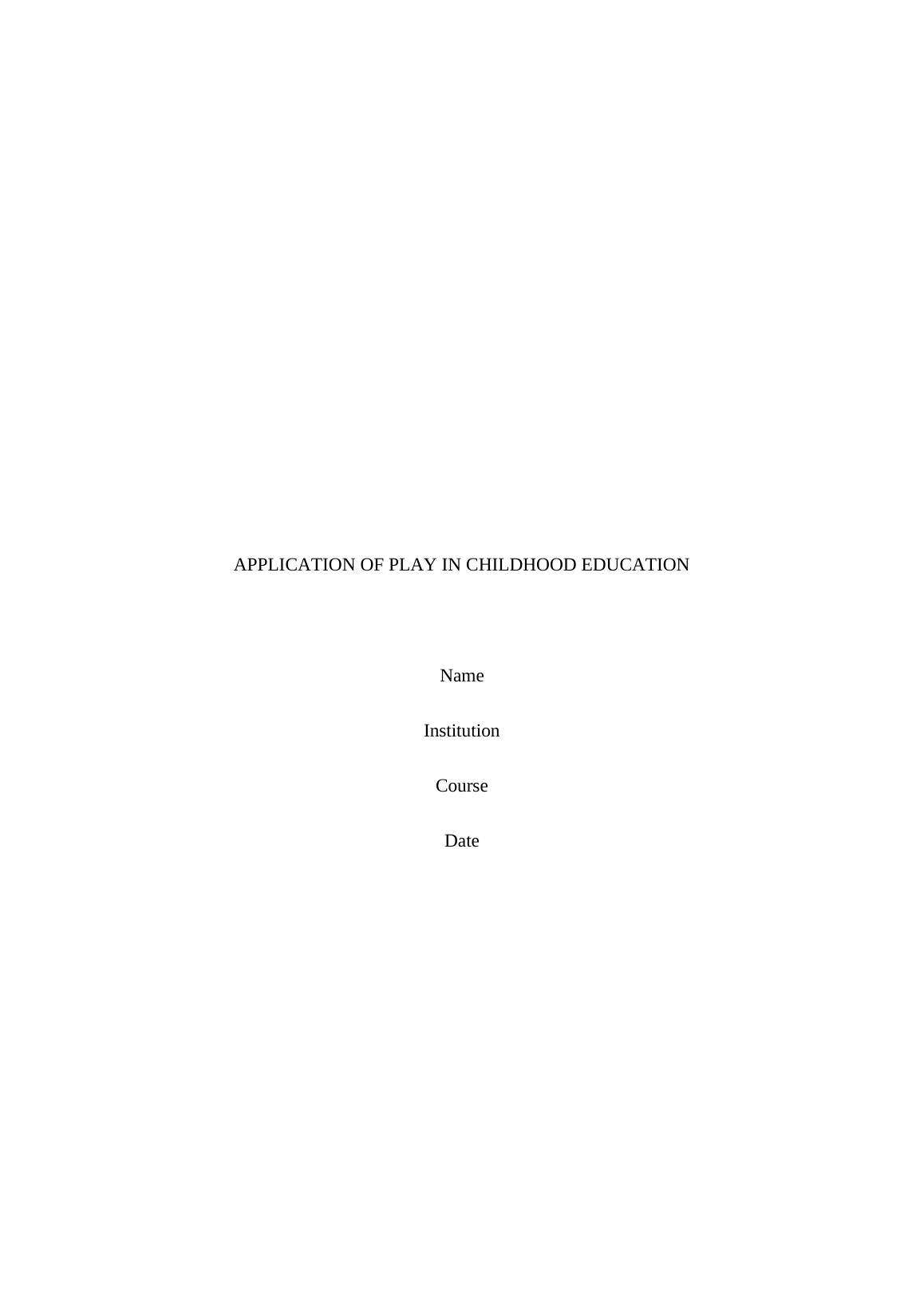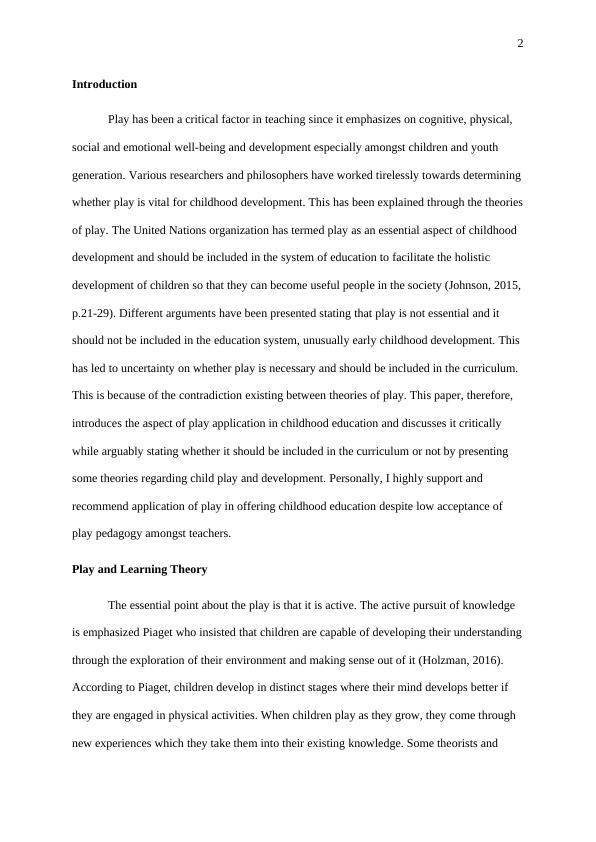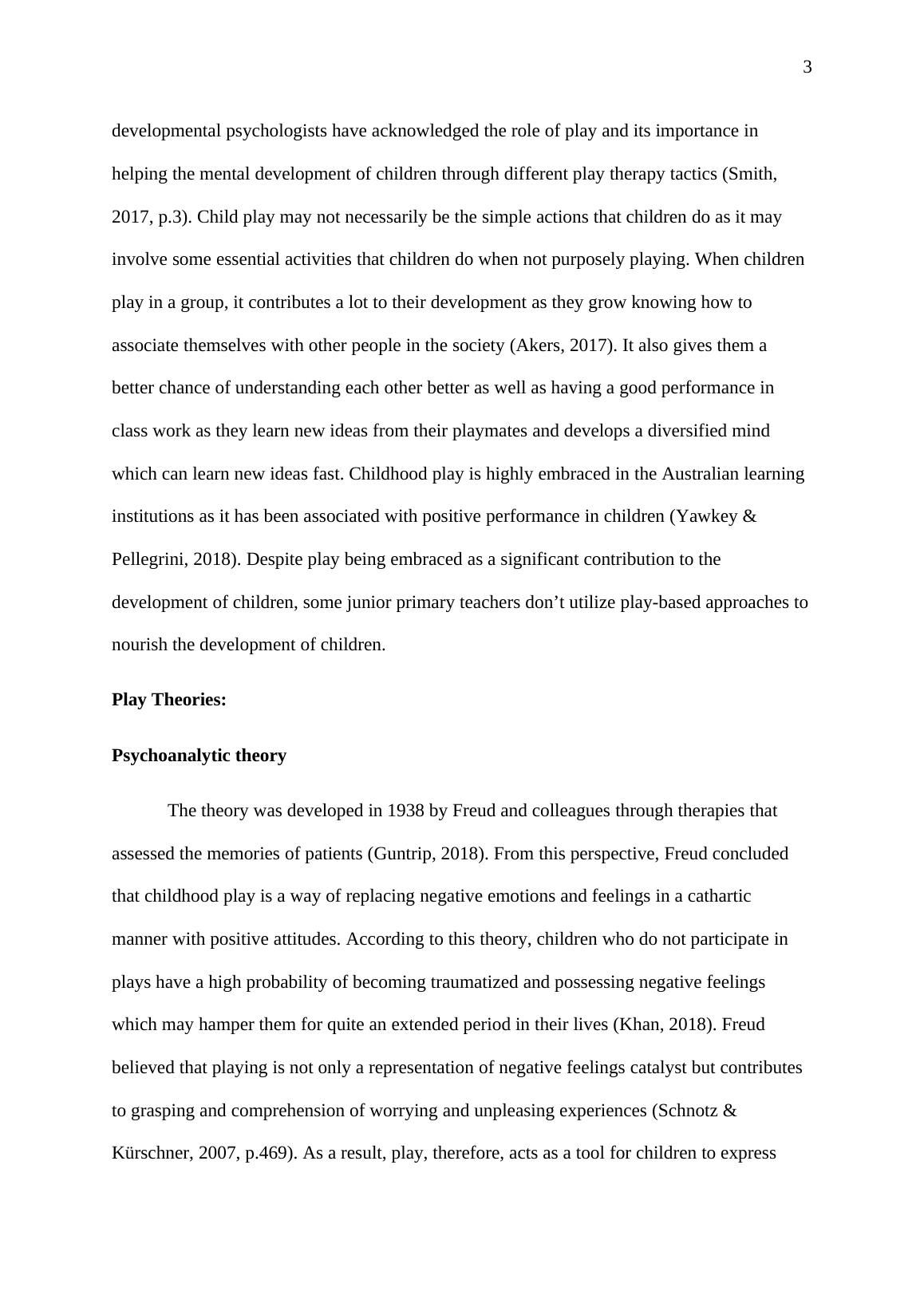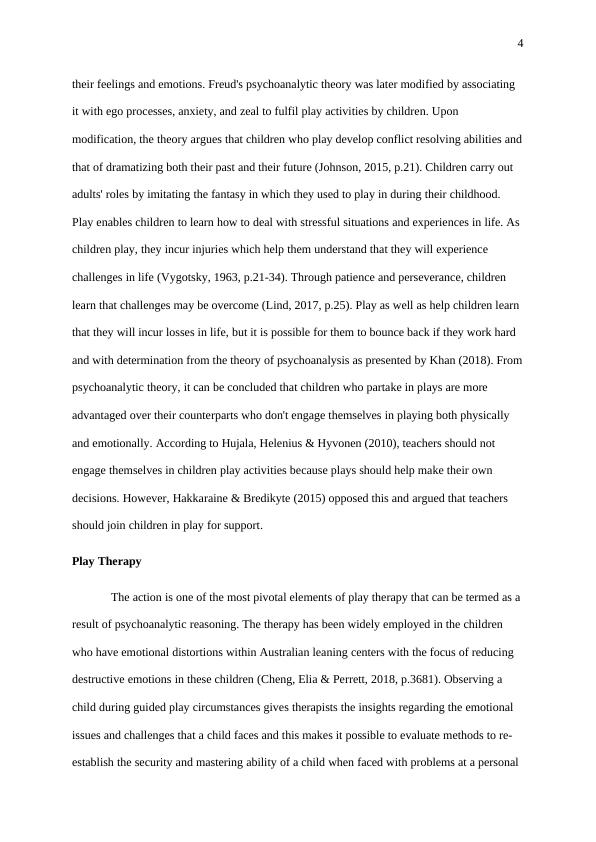(PDF) Play in Early Childhood Education
Added on 2021-04-24
13 Pages3450 Words13 Views
APPLICATION OF PLAY IN CHILDHOOD EDUCATIONNameInstitutionCourseDate

2IntroductionPlay has been a critical factor in teaching since it emphasizes on cognitive, physical, social and emotional well-being and development especially amongst children and youth generation. Various researchers and philosophers have worked tirelessly towards determiningwhether play is vital for childhood development. This has been explained through the theoriesof play. The United Nations organization has termed play as an essential aspect of childhood development and should be included in the system of education to facilitate the holistic development of children so that they can become useful people in the society (Johnson, 2015,p.21-29). Different arguments have been presented stating that play is not essential and it should not be included in the education system, unusually early childhood development. This has led to uncertainty on whether play is necessary and should be included in the curriculum. This is because of the contradiction existing between theories of play. This paper, therefore, introduces the aspect of play application in childhood education and discusses it critically while arguably stating whether it should be included in the curriculum or not by presenting some theories regarding child play and development. Personally, I highly support and recommend application of play in offering childhood education despite low acceptance of play pedagogy amongst teachers. Play and Learning TheoryThe essential point about the play is that it is active. The active pursuit of knowledge is emphasized Piaget who insisted that children are capable of developing their understandingthrough the exploration of their environment and making sense out of it (Holzman, 2016). According to Piaget, children develop in distinct stages where their mind develops better if they are engaged in physical activities. When children play as they grow, they come through new experiences which they take them into their existing knowledge. Some theorists and

3developmental psychologists have acknowledged the role of play and its importance in helping the mental development of children through different play therapy tactics (Smith, 2017, p.3). Child play may not necessarily be the simple actions that children do as it may involve some essential activities that children do when not purposely playing. When children play in a group, it contributes a lot to their development as they grow knowing how to associate themselves with other people in the society (Akers, 2017). It also gives them a better chance of understanding each other better as well as having a good performance in class work as they learn new ideas from their playmates and develops a diversified mind which can learn new ideas fast. Childhood play is highly embraced in the Australian learning institutions as it has been associated with positive performance in children (Yawkey & Pellegrini, 2018). Despite play being embraced as a significant contribution to the development of children, some junior primary teachers don’t utilize play-based approaches tonourish the development of children. Play Theories: Psychoanalytic theoryThe theory was developed in 1938 by Freud and colleagues through therapies that assessed the memories of patients (Guntrip, 2018). From this perspective, Freud concluded that childhood play is a way of replacing negative emotions and feelings in a cathartic manner with positive attitudes. According to this theory, children who do not participate in plays have a high probability of becoming traumatized and possessing negative feelings which may hamper them for quite an extended period in their lives (Khan, 2018). Freud believed that playing is not only a representation of negative feelings catalyst but contributes to grasping and comprehension of worrying and unpleasing experiences (Schnotz & Kürschner, 2007, p.469). As a result, play, therefore, acts as a tool for children to express

4their feelings and emotions. Freud's psychoanalytic theory was later modified by associating it with ego processes, anxiety, and zeal to fulfil play activities by children. Upon modification, the theory argues that children who play develop conflict resolving abilities andthat of dramatizing both their past and their future (Johnson, 2015, p.21). Children carry out adults' roles by imitating the fantasy in which they used to play in during their childhood. Play enables children to learn how to deal with stressful situations and experiences in life. As children play, they incur injuries which help them understand that they will experience challenges in life (Vygotsky, 1963, p.21-34). Through patience and perseverance, children learn that challenges may be overcome (Lind, 2017, p.25). Play as well as help children learn that they will incur losses in life, but it is possible for them to bounce back if they work hard and with determination from the theory of psychoanalysis as presented by Khan (2018). Frompsychoanalytic theory, it can be concluded that children who partake in plays are more advantaged over their counterparts who don't engage themselves in playing both physically and emotionally. According to Hujala, Helenius & Hyvonen (2010), teachers should not engage themselves in children play activities because plays should help make their own decisions. However, Hakkaraine & Bredikyte (2015) opposed this and argued that teachers should join children in play for support. Play Therapy The action is one of the most pivotal elements of play therapy that can be termed as aresult of psychoanalytic reasoning. The therapy has been widely employed in the children who have emotional distortions within Australian leaning centers with the focus of reducing destructive emotions in these children (Cheng, Elia & Perrett, 2018, p.3681). Observing a child during guided play circumstances gives therapists the insights regarding the emotional issues and challenges that a child faces and this makes it possible to evaluate methods to re-establish the security and mastering ability of a child when faced with problems at a personal

End of preview
Want to access all the pages? Upload your documents or become a member.
Related Documents
Emergent Philosophy of Educationlg...
|14
|4193
|80
National Curriculum Analysis 2022lg...
|7
|3002
|33
(PDF) Developmental Perspectives on Learninglg...
|11
|2942
|102
The Importance of Early Childhood Education Theorylg...
|10
|2242
|24
Curriculum Model for Business Studies Studentslg...
|10
|666
|372
Learning Through Play in Early Childhood Educationlg...
|16
|3349
|38
